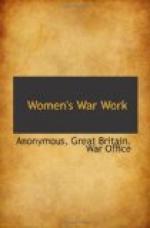The organization of war charities is now in England controlled by the War Charities Committee appointed by the Government in April, 1916. The committee controls not only what could be strictly termed War Charities, but all war agencies of any kind for which appeals for funds are made to the public. These organizations must be registered and approved by the committee, and their accounts must be open to inspection and audit. This was a wise and necessary step, not so much because of actual fraudulent appeals—there has been practically none of that, but there was a certain amount of overlapping and of waste of money, material and energy, and some very few organizations in which an undue proportion of funds raised was absorbed in expenses. Comforts for soldiers and prisoners of war parcels are also now co-ordinated under two national committees.
The first work of registering Belgian refugees and of providing French and Flemish interpreters was done by a voluntary organization—the London Society for Women’s Suffrage (a branch of N.U.W.S.S.), which has always been notable for its admirable organization. It provided 150 interpreters for this work in a few days, and work was carried on at all the London Centres from early morning till midnight. When the Government took over the charge of Belgian refugees, the system of registration used by the London Society was adopted without change by them and the organizer in charge was taken over also and put in a very responsible position at the War Refugees Committee’s Headquarters.
The work of our Government Employment Exchanges (which were established before the War by the Board of Trade) and are now under the Ministry of Labour—has been supplemented by various Professional Women’s Bureaus, by the compiling of a Professional Women’s Register, secured through Universities, Colleges, Headmistresses’ Association, etc., and by the setting up of the Women’s Service Bureau by the London Society for Women Suffrage (N.U.W.S.S.). Various women’s organizations have established most valuable clearing houses for voluntary workers in Scotland and England and Wales. The Women’s Service Bureau has dealt with 40,000 applications for voluntary and paid work—mostly paid. Its interviewers take the greatest trouble to place these applicants suitably, and to find out just what they can do or would be good at doing.
Our biggest Government arsenal secured their first munition supervisors through it—and the Government Departments, big firms, factories, organizations, banks, workshops, institutions of any kind, send to it for workers.
It not only finds these posts without charge—it is supported entirely by voluntary contribution—but it has a loan and grant fund to enable women and girls without money to pay for training and maintenance.
Its records and the letters in its flies provide reading that is as absorbing as any novel, and it was one of the wise agencies that realized the older woman had a place and could help as well as the younger ones.




